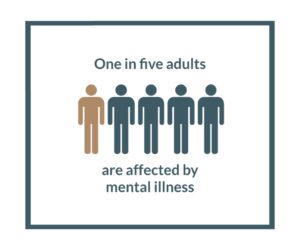By Christa Banister
Apple knew what they were doing in 2010 when they trademarked the phrase, “There’s an app for that.” Our smartphones, no matter the brand or platform, have single-handedly changed the way we live. For many, it has eliminated the need to go to the bank, served as a boarding pass or concert ticket, tracked our steps and macronutrients, and made shopping and food delivery almost instantaneous.
And for those who’ve eschewed traditional therapy in the past, apps have also made seeking effective mental health support easier and more accessible than ever.
When COVID-19 arrived on the scene and recalibrated how we lived, worked, and interacted within our communities, the shift toward online therapy was particularly timely. With depression rates tripling during the pandemic’s first year, according to Brown reporting, having easier, 24/7 access to licensed clinicians helped lower the hurdles in prioritizing mental healthcare.
For some, telemedicine actually “deepened the therapeutic relationship” by helping patients feel more comfortable. According to Healthline.com, some claimed it was easier to disclose more behind a screen than in person.
But when considering the therapy that’s right for you, are there trade-offs for the convenience that online therapy offers? Is the level of care just as good? What are the pros and cons of telehealth?
Online Therapy’s Advantages
When exploring the pros and cons of online therapy, many experts from the National Institute of Mental Health noted that modern technology provides many positives for both clients and clinicians.
Considering how one in five adults are affected by mental illness, and 97% of people living in the United States own a smartphone according to US News & World Report, having access to apps that offer lifesaving mental health services opens therapy up to everyone.
A few additional benefits of online therapy include:
- A lower price point than traditional therapy
- Accessibility for anyone with an internet connection, including rural areas
- Easier navigation for those with physical limitations
- Ability to log on immediately in the event of a sudden need
- Anonymity in signing up without involving others
- A good first step if you have been reluctant to try therapy
- Intervention support around the clock
- The comfort of opening up in an environment of your choice (such as your home)
- A complement to in-person therapy for additional support
- An option to participate in specialized treatment programs remotely
Additionally, because recovery is a lifelong journey, the benefits of online therapy allow for you to regularly check in and stay connected. Research shows that the longer you intentionally stay engaged, the better your chances of long-term success.
Where Online Therapy Is Lacking
While the benefits of online therapy have been well-documented as being as effective as in-person therapy, according to VeryWellMind.com, one of its weaknesses is that it isn’t appropriate for serious psychiatric illnesses.
Online therapy can be a great tool for treating moderate depression, social anxiety, panic disorders, and generalized anxieties. However, if you have a serious addiction or deal with more complex symptoms of a mental health condition, online therapy needs to occur in tandem with other in-person therapies and treatments. Not exclusively.

And depending on where you live, some insurance companies may not cover online therapy services. Conversely, some online therapists may not accept insurance. Privacy concerns, including leaks and hacks, have also been raised since personal information is being shared online.
The old joke about technology being great “when it works” also can apply. When it’s difficult to access treatment because of tech issues, it may be frustrating enough to consider chucking it altogether.
In the same way you may prefer to pay your bills by check, print physical copies of your travel itineraries, or write your appointments in a planner with a pen, telehealth pros and cons might lean toward the latter. But if your life is increasingly busy with little time for therapy appointments in the middle of the day, the tangible benefits of teletherapy may far outweigh any possible cons.
Ongoing Support Through Apps
At Meadows Behavioral Healthcare (MBH), we offer a specialized range of resources, including apps, to help foster community and provide 24/7 support.
With our MBH Onward app, you’ll be matched up with other MBH alumni who have completed treatment at your same campus, so your conversations, support, and resources will be tailored to your specific needs. With practical tips, inspiring stories, access to informative articles and podcasts, and interaction that encourages engagement and accountability, you’ve got a community who “gets it” at your fingertips.
For those participating in our virtual IOP program, our MBH Connect app offers seamless access to our counseling and treatment services. With just a few clicks, our caring, knowledgeable team will walk you through the entire process before treatment ever begins. To learn more about all we offer at The Meadows Outpatient Center, reach out today, and we will gladly help you find the care that you need.

